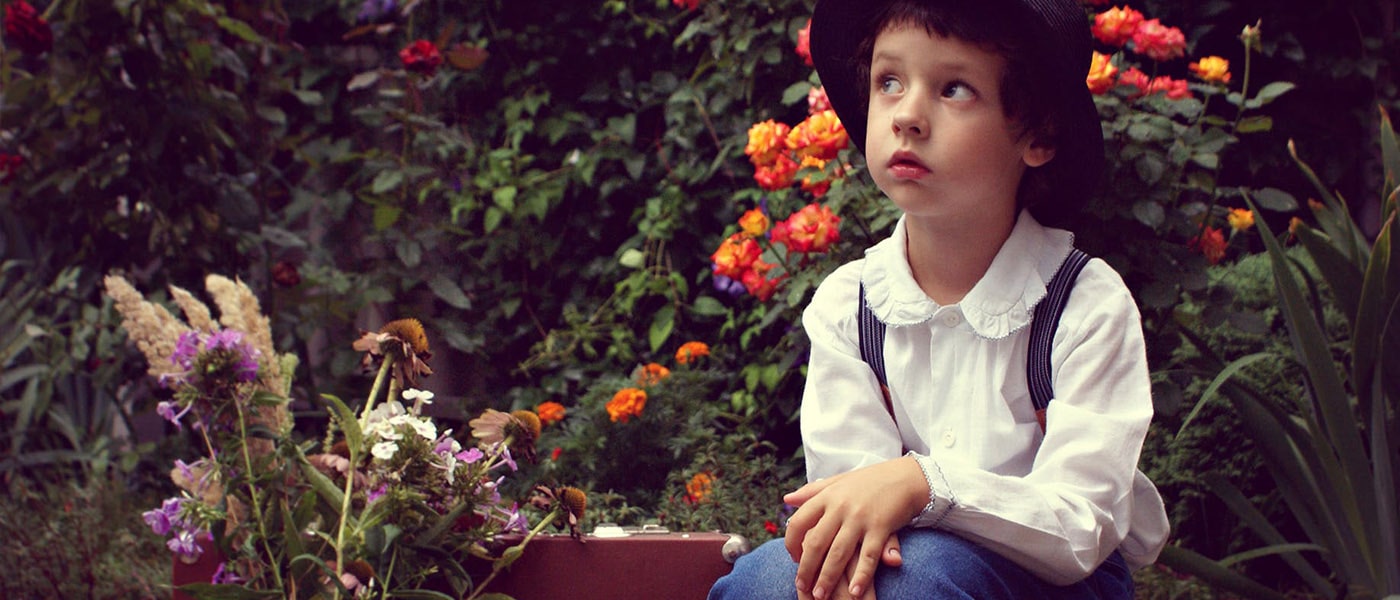

The Kind Nurse
“Your Lord has decreed that you shall not worship anyone except Him, and He has enjoined kindness to parents. Should they reach old age at your side one of them or both do not say to them," Fie!" And do not chide them, but speak to them noble words” (17:23). Sitting on the porch of her house, with a deep frown on her face, she seemed absorbed by some unending thoughts. She did not know where she was, neither the boy who was so kindly and attentively taking care of her like a kind nurse, nor the deep unknown feeling that steered within her when he helped her. The only thing she remembered, was that her beloved husband had died and she was left alone.
It had been so many years since the mirror in her room reflected the view of a white-haired, withered, old woman sitting in a wheelchair. But still, she wanted to solve the mystery of the boy’s identity. “Someone must have hired him to take care of me,” she thought. “But who? I’m sure I have no one.”
Instantly, the door of the house opened, and the mysterious young nurse appeared, wearing a big and cheerful smile and a warm, loving look on his face [i][ii] [1]. He had brought her pills. As usual, he put the pills one by one and patiently in her mouth and gave her water to swallow them.
Then kissed her on the forehead and hugged her tightly. She remembered the days when she did not feel good. When she shouted and cursed him violently. She also remembered his patient face at those moments, when he was trying so hard to hold back his tears, taking her hands and kissing them. “What kind of a nurse is he?” she wondered. Respect was an inseparable part of his behavior toward her, always observing not to raise his voice, not to walk ahead of her, and not to act in a way that would make her feel ashamed and humiliated [iii] [2].
She did not remember if she had ever asked him who he was. So, she gathered her courage to ask and went inside. Entering the house, she saw a man sitting on the couch, arguing on an apparently serious matter with her nurse. “Let’s not bother them,” she thought and turned her wheelchair toward her room, but suddenly something caught her attention.
The man was shouting so she could not help hearing his words: “she does not remember you, not even your name and you are wasting your time here nursing her? What about your job? You are a successful manager for GOD’s sake!” The old woman turned to the boy to see his face. For the first time, she saw the look of rage in him: “She doesn’t, but I do. She is my mother, and I will take care of her to my last breath. “For the record, I became what you say I am, because of her.”
He suddenly felt the weight of the old woman’s look on him. Tears fell on her cheeks irresistibly. After all, the mystery had been solved: her kind and a generous nurse was her loving son, her one and only child.
The next day, when she woke up, the first thing she wanted to see was the face of her nurse, his smile, his kind look. She did not know his name or that why he was there, but she felt sure that her patient, loving and a nice nurse would never ever leave her alone.
Notes:
[i]. The Messenger of Allah (peace be upon him and his family) said: “Every righteous child who casts a look of mercy and affection upon his parents shall be granted, for every look of his, Rewards equivalent to that of an accepted Hajj.”
[ii]. The Messenger of Allah (peace be upon him and his family) has said: “The look of a child towards his parents out of love for them is an act of worship.”
[iii]. Imam as-Sadiq (peace be upon him) has said (in regards to one’s parents): “Do not cast your gaze upon them except with love and compassion; do not raise your voice above theirs; do not raise your hands above theirs; do not walk ahead of them.”
References:
- 'Allama Majlisi, Bihar al-Anvar, V. 74, p. 73
- ibid, V. 74, P. 79
Share This Article

Why does Islam allow polygamy? Part 2
As stated in the first part, Islam brought about reforms in the customs previous nations, including Arabs, had in practicing polygamy in Islam:
The Limitation in the Polygamy in Islam
The first reform Islam enforced was the restriction it imposed upon polygamy. Before the advent of Islam, there was no limit to the number of wives. One man could keep hundreds of wives and thus establish a harem for them, just as the ones some kings had, which is strictly banned in the religion of Islam.
However, Islam put a maximum limit on their number, and an individual was not allowed to have more than four wives simultaneously.
Justice:
The other reform that was made upon polygamy in Islam was the condition under which there must never be, for any reason, discrimination between the wives or their children. The Holy Quran explicitly commands:
"But if you fear that you may not treat them fairly, then [marry only] one" (4:3)
As a matter of fact, those men who can observe full justice with a number of wives are very few. It is clearly stated in the following verse of the Quran which is in association with the previous verse:
"you will not be able to be fair between wives, even if you are eager to do so..." (4:129)
Allah explains here that justice between the wives in its true sense - to stand exactly in the middle of the extremes - is beyond human power even if one may wish it. What a man is obliged to do is that he should not be totally inclined to one of them, leaving the other one as she were in suspense… [1].
Other conditions for Polygamy in Islam
Besides these two main restrictions, there are other responsibilities and duties polygamous men have to fulfill toward all their wives; such as Nafaqah (alimony) and Mahrieh (marriage portion), etc. [see the article about the rights of the wife over her husband]
The Best Form of Marriage in Islam
Ultimately, there is no dispute about the fact that monogamy is better; it is actually the best and most natural form of marriage in Islam. Obviously, the spirit of marital life which is oneness and unity is attained better and with more perfection with a single spouse.
It is only within this form of marriage that family commitment makes sense, and the great bond that unites the hearts of husband and wife makes them become one soul and one flesh [2].
Polygamy in Islam, on the other hand, rises from a social problem that rests heavily on the shoulders of all men and married women and for which a better solution has not yet been found. We have to face the fact that monogamy is not practical in specific social circumstances, and polygamy -under the mentioned conditions- is the most significant saving factor for monogamy.
A Choice between Conflicting Alternatives
One of two alternatives should be chosen: either the restricted acceptance of polygamy -as a duty rather than pleasure-, or the love affairs system, which is common in some societies these days. In other words, a few married men should marry more than one wife -of course under the condition of fulfilling all the above-mentioned responsibilities of a husband in a polygamous family-, and these will certainly not exceed a few percents, and unmarried women should settle, get home and make a life for themselves; or else open the way for love affairs.
In the case of the second alternative, the women deprived of family life may associate at her own free will with several men, and, as a result, almost all married men will in practice be polygamists.
Even then the matter will not end. The wives who will find their husbands to be unfaithful will think of taking revenge upon them and thus will themselves become unfaithful. This final result has been summarized in the well-known Kinsey report in one sentence: “The men and women of America have surpassed all other nations in unfaithfulness” [3].
Now, which alternative do you think is better?
References:
- polygamy
- Morteza Motahari, women and her rights in Islam, p. 148
- Morteza Motahari, women and her rights in Islam, p. 150
- polygamy in islam
Read More

You Are Responsible for Your Flower
“He is only a child!”, “Be quiet, this is a grown-up issue”, “Go to your room and don’t disturb us while we are talking” … What do these sentences remind you of? Your own childhood? Your little son or daughter? you have probably heard these statements at least once or twice in your lifetime. Remember this, “ You are responsible for your flower ”. Now let’s read the following extract in this regard:
“It was the time of prayer (Salat). Prophet Muhammad (PBUH&HP) who was with his grandchild, Hassan Ibn Ali (AS), invited people to perform this holy task. While standing for Salat, Prophet put the child beside himself and started his prayer. People who were behind him wondered why he had lingered in prostration for a long time, but there was no way for them to find out the cause in the middle of Salat. After they had finished, they inquired the reason of the Prophet (PBUH&HP): ‘we had never seen such a prostration from you. We thought that you were receiving revelations from Allah that made you linger in your prostration for such a long time’. He answered: ‘No it was not a revelation. My child, Hassan (AS), was climbing over me when I was in prostration and I did not want to rush and put him down. So I waited for him long enough to come down himself’” [1].
Or consider this account:
“Once prophet Muhammad (PBUH&HP) and other Muslims stand to perform Midday prayer (Salat al-Zuhr) in a congregational manner. However, after performing the second Rak’ah, Prophet (PBUH&HP) suddenly made haste in finishing the two remaining Rak’ahs. After the prayer was finished, the people around him asked: ‘Has something unpleasant happened that you made haste in completing your prayer?’ Prophet answered: ‘Haven’t you heard the voice of that baby who was moaning?’” [2]
These and many other examples from our kind Prophet shows the deep regard of our religion for the dignity and self-worth of children in Islam.
Through his speech and manner, Prophet Muhammad (PBUH&HP) constantly invited his followers to treat children in Islam with respect and to devote great attention to their behavior toward them; when his grandchildren entered a room, Prophet (PBUH&HP) would stand up and welcome them warmlyi, he was always the first one who greeted children and never refused children’s request for playing with them and participated in their games [3].
As a result of this kind of behavior, children in Islam will feel worthy of respect and will show more confidence in their actions. Consequently, when they grow up, they will be able to take risks and use their full capacity not being afraid of failure and humiliation.
On the contrary, the child whose dignity has been neglected by his/her parents will end up being shaky and not confident, not able to decide for his/her life and find his/her way to success. A beautiful analogy by Prophet Muhammad (PBUH&HP) will clarify this fact more: “my cloth will be cleaned by water, but what will cleanse my child’s heart from the dust of discomfiture and the pain of humiliation?” [4]
So, in raising our children in Islam, it is our responsibility to be highly observant not to say something or act in a way that would deny their self-worth and dignity and belittle them in any way. Children are sensitive creatures, like flowers, an action or a remark which may seem to us unimportant and natural, can wither their beautiful and innocent souls easily, and mark a permanent injury on their heart. Remember, “You are responsible for your flower”.
Notes:
[i]. This behavior of Prophet (PBUH&HP) was probably because of the great personality and value of Imam Hassan (AS) and Imam Hossein (AS), however, when we consider it along with other Hadiths, we can easily distinguish the affectionate and compassionate manner of him toward children.
References
- Ibn Shahr Ashub, Muhammad. Manaqib Al Abi Talib. V.4, P.24.
- Ali Ibn Hassan Tabarsi. Meshat al-Anvar. P. 243.
- Abbas Qomi. Safinah al Bahar. V.2, P.676.
- Falsafi, Muhammad Taqi. Child in Hereditary and Upbringing View (Kudak Az Nazare Verasat va Tarbiat). P.259.
Read More

